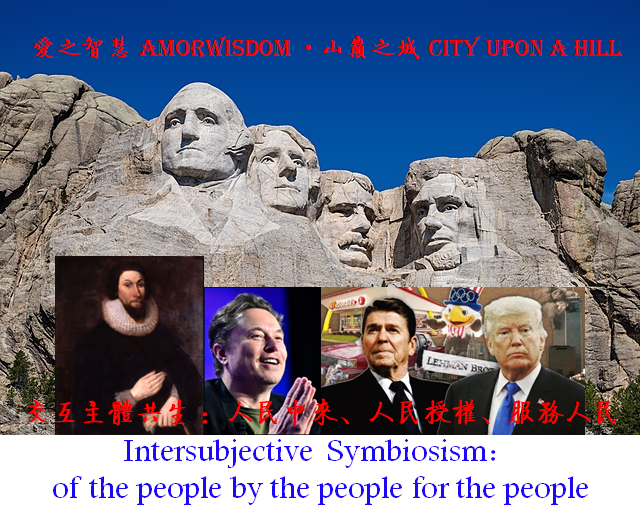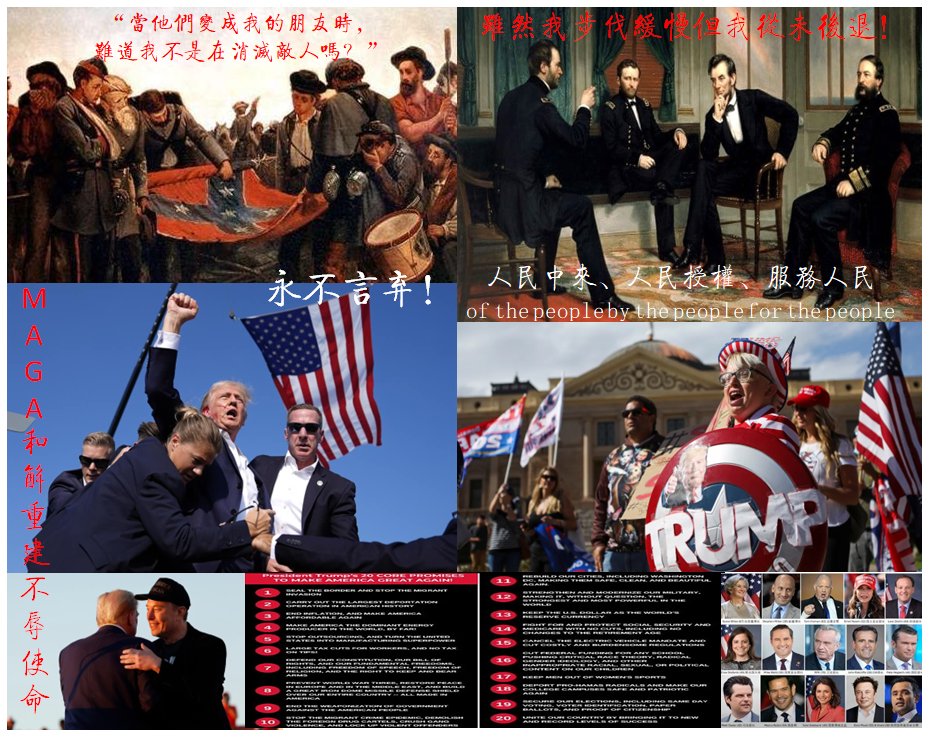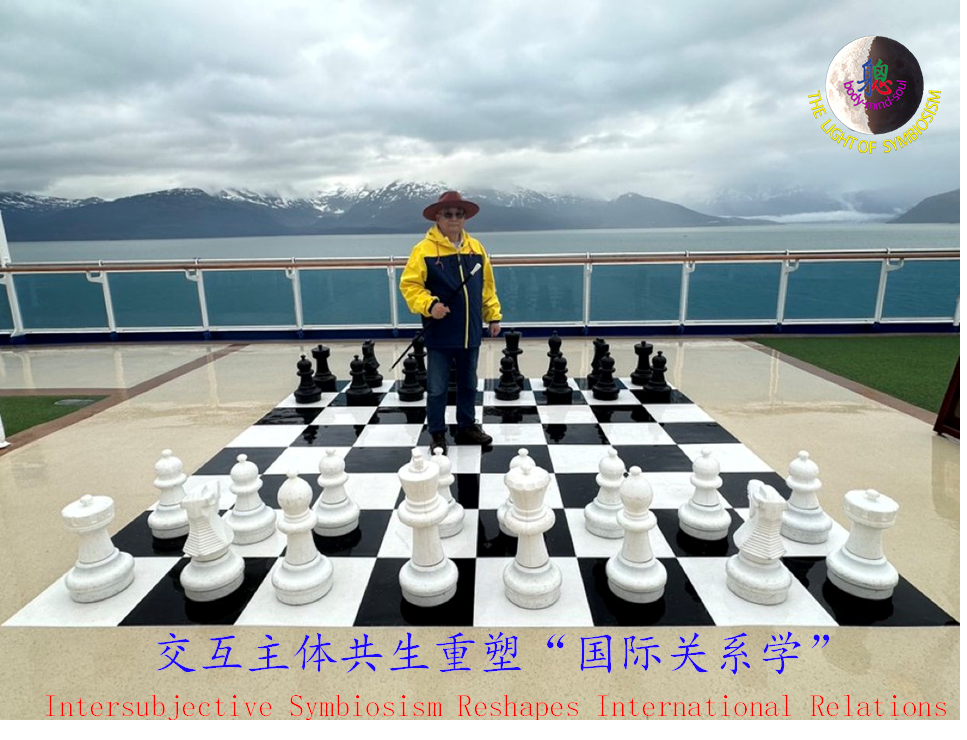胜利者无需复仇——从林肯的和解与重建中汲取爱之智慧(Amorsophia)
胜利者无需复仇!
——从林肯的和解与重建中汲取爱之智慧(Amorsophia)
钱 宏 Archer Hong Qian
“内战无胜者”,“沒有敵人, 只有同胞”“当他们变成我的朋友时,难道我不是在消灭敌人吗?”——林肯
“我们的任务一定要解放我们自己,扩大我们同情的圈子,包容所有的生命和美妙的大自然。”——爱因斯坦
“交互主体共生”(Intersubjective Symbiosism)哲学,建立在所有人拥有生命自组织连接世界动态平衡的权能基础上。而社会的不公与分裂,源于特权者“以强凌弱”“欺善怕恶”的行为。要化解冲突、重建世界新秩序,必须承担起“除强扶弱助优”的责任。这不仅是“因真理、得自由、行公义、以共生”的关键,也是伟大的治理者勰调国内外关系的根本途径。
美国历史昭示我们,真正的胜利者并不执着于仇恨与报复,而是以宽容和智慧塑造新秩序。
南北战争期间及后的林肯,为我们提供了启示。他通过《宅地法》和重述宪法We the People(我们人民)为美国“政治价值的基石”,从而规范共和国政府的道德约定基础of the people by the people for the people(人民中来、人民授权、服务人民),赋予普通民众国是权、国事权、国土权,增强社会创造活力,同时,避免对南方采取报复性措施,而是“宽容对待”,并着眼于和解与重建,给白人土地,给黑人自由,定美利坚为“合众国”(United States),从而为国家的长远和平繁荣奠定了基础。
今天,再次当选美国总统的川普先生,同样面临化解分裂冲突与重建新秩序的机遇与挑战。他若能以“交互主体共生”的理念为指引,超越个人是非恩怨与历史包袱,以包容化解矛盾,以责任推动改革,完全有能力为美国开启一个全新的篇章。
抓大放小:聚焦核心承诺,摒弃个人恩怨
1、林肯的经验启示:
林肯抓的大,就是重建国家公孞力,恢复社会创造力,放下小,就是淡化恩怨,避免胜利者的傲慢。重建政策聚焦于和解与团结,而非对战败者的打压,为国家和平繁荣奠定了坚实基础。
2、川普的共生使命:
今天,川普若要在错综复杂的环境中出类拔萃,关键在于专注于赋有交互主体共生智慧的“对美国的20个核心承诺”。个人恩怨,过往的选举争端、媒体不公批评,都是“小”,放下过往直面未来,开启新的序章,才是真正善于胜利、敢于胜利的历史书写者!
共生的核心:扶弱、助优、抑强,重建新秩序
林肯的和解与重建政策,不仅是扶弱助优抑强的典范,而且通过温和的策略修复信任,避免了对“再次成为同胞”的南方的羞辱与压迫。正是这种双管齐下的策略——既扶持弱势群体,又遏制强权的滥用——为美国的复兴注入了持久动力。这就是国家治理中的爱之智慧(Amorsophia)。

川普胜选后发布的对美国的20个核心承诺,充分表明他继承并赋有这种爱之智慧,即以其20项核心承诺为治理基石,着力解决社会中的系统性结构性失衡问题,如经济不平等、社会两极化以及特权阶层的不当影响(表现为效率低下资源浪费)。美国内部的种族矛盾、城乡差距和阶层分化已成为制约社会发展的主要障碍。精英阶层的权力过度集中,使普通民众对社会公正的信任日益削弱。通过分散权力、加强社会协作,通过采取扶弱、助优、抑强的政策,修复社会信任与活力平衡。川普完全能够做到超越党派对立,聚焦于共同利益与社会凝聚力的提升,重新构建具有国家公信力的团结。
新秩序的全球意义:重塑国际关系
在国际层面,川普先生同样可以运用美国的影响力,通过扶弱、助优、抑强,推动全球范围内的和平稳定与繁荣。这不仅有助于维护全球秩序,也能重塑美国的道义与战略领导力。
因为国际冲突,同样往往源于强权国家或跨国集团对弱小国家的过度求同存异式压迫和掠夺性侵扰。但只要坦诚相见,以智慧和实力,没有解决不了的矛盾。比如终结俄乌战争,完全可能通过构建交互主体共生的国际关系,我冒昧地认为可以找到更富有未来观念的第三条终战的道路,开创建构国际关系新格局——即以“全球共生,永久和平”为核心的世界新秩序。
这里不细说,有心的读者请参看《关于人类战争止战的五种方式——附录“终结乌克兰战争的第三条道路”》(http://symbiosism.com.cn/9023.html),以及Archer《Intersubjective Symbiosism Reshapes International Relations》(http://symbiosism.com.cn/8565.html)。
精英的责任:反思与行动的契机
“交互主体共生”不仅需要调整社会结构,也要求知识精英重新审视自身角色。诺贝尔奖得主和其他知识精英曾集体批评川普及其支持者的“民粹主义”,但这恰恰反映了精英与大众之间的断裂。
诸如精英主义与民粹主义、左派与右派、新自由与新保守等与“交互主体共生”相悖的思维套路,恰恰是真正的精英需要勇于抛弃的陈词滥调。以共生哲学观之,他们承担起这样的时代责任:
1、从批评到建设:与其对民众的选择进行居高临下的指手画脚,甚至指责,不如主动参与社会裂痕的修复,与普通选民共同寻找已经暴露问题的解决之道。
2、从权威到互动:精英需要摆脱单向施教的传统角色,与民众建立更加平等的对话机制,通过交互脑力激荡,共创社会价值。只要精英们甘愿放下身段与大众携手行动,社会交互主体共生的愿景,就能真正落地腾飞。
结语:以责任担当引领变革
真正的胜利不在于强权的压制,而在于创造一个公正而可持续的未来生活方式。林肯的领导力表明,For the People打最好的仗,扶持弱者、助优而抑制强权,能够弥合社会裂痕,和解与重建,为世界长远的繁荣奠定基础。
今天,川普同样面临历史的重担与机遇。若能以“交互主体共生”的哲学为根基,承担起“除强扶弱助优”的历史责任,他不仅能够重塑美国的国内外格局,更能开创一个公义共生的全新时代。这条道路需要智慧、包容与坚定,但也为其赢得真正的历史性成就提供了机会。正所谓心态改变命运,思路决定出路。川普先生将不仅仅是一位美国大选的胜利者,更是一位为人类开创未来生活方式的变革者。
孞烎2024年12月1日于温哥华
Victors Need No Revenge!
——Drawing Amorsophia(爱之智慧) from the Reconciliation Paradigm of the American Civil War
By Archer Hong Qian
The philosophy of Intersubjective Symbiosism is rooted in the idea that all individuals possess the capacity for self-organized balance and dynamic connectivity with the world. Social injustice and division arise from the actions of the privileged who “oppress the weak” and “bully the good while fearing the evil.” To resolve conflicts and rebuild a new world order, we must take on the responsibility of “curbing the strong, supporting the weak, and empowering the capable.” This is not only essential for “living by truth, gaining freedom, practicing justice, and embracing symbiosis,” but also serves as the fundamental approach for great leaders to reconcile domestic and international relations.
American history teaches us that true victors are not consumed by hatred or revenge but instead use tolerance and wisdom to shape a new order.
Lincoln’s leadership after the Civil War offers timeless inspiration. Through initiatives like the Homestead Act and his reinterpretation of the Constitution’s “We the People,” he redefined governance as “of the people, by the people, for the people.” By granting ordinary citizens rights to national affairs, governance, and land, he revitalized societal creativity. Simultaneously, he refrained from punitive measures against the South, focusing instead on reconciliation and reconstruction, laying the foundation for enduring peace and prosperity in the nation.
Today, President Trump, re-elected to office, faces similar opportunities and challenges to resolve division and rebuild order. Guided by the philosophy of Intersubjective Symbiosism, he has the chance to transcend personal grievances and historical burdens. By embracing inclusivity to resolve conflicts and using responsibility to drive reform, he can open a new chapter for the United States.
Focus on the Big Picture: Core Commitments Over Personal Grievances
Lincoln’s Lessons:
Lincoln’s greatness lay in rebuilding national governance and restoring social creativity. His “letting go” came in the form of de-emphasizing grievances and avoiding the arrogance of victors. His reconstruction policies prioritized reconciliation and unity over oppression of the defeated, laying the groundwork for long-term peace and prosperity.
2.Trump’s Symbiotic Mission:
For Trump to stand out amidst a complex environment, he must focus on fulfilling the 20 Core Commitments to America, which are imbued with intersubjective symbiotic wisdom. Personal disputes, election controversies, and media criticism are mere “small matters.” By letting go of the past and facing the future head-on, he has the opportunity to open a new chapter in history, demonstrating the courage and skill of a true leader.

The Core of Symbiosis: Support the Weak, Empower the Capable, Curb the Strong, and Rebuild Order
Lincoln’s reconciliation and reconstruction policies exemplified this balance. Through a gentle approach that repaired trust while avoiding humiliation or oppression of the South, he combined support for the weak with curbs on the abuse of power. This dual strategy injected lasting momentum into America’s revival, embodying the wisdom of love (Amorsophia) in governance.
Trump’s 20 Core Commitments to America reflect a similar Amorsophia. They aim to address systemic and structural imbalances, such as economic inequality, social polarization, and undue elite influence (manifesting as inefficiency and resource waste). Racial tensions, urban-rural divides, and class disparities within the United States have become major obstacles to development. The excessive concentration of power among elites has eroded trust in social justice. By decentralizing power, strengthening social collaboration, and adopting policies that support the weak, empower the capable, and curb excess power, Trump can rebuild social trust and vitality. This approach allows him to transcend partisan divisions, focus on common interests, and rebuild national cohesion with integrity.
Global Implications of a New Order: Reshaping International Relations
On the international stage, Trump can similarly leverage America’s influence to promote global peace, stability, and prosperity through the principles of supporting the weak, empowering the capable, and curbing the strong. This not only safeguards global order but also reshapes America’s moral and strategic leadership.
International conflicts often stem from the exploitative oppression and predatory interventions of powerful nations or multinational corporations against weaker states. Yet, with honesty, wisdom, and strength, no conflict is insurmountable. For example, ending the Russia-Ukraine war is entirely possible by establishing intersubjective symbiotic international relations. I humbly propose that a more forward-looking “third path” to peace could pave the way for a new international order, centered on “global symbiosis and lasting peace.”
For further reading, interested readers may consult: Five Methods for Ending Human Wars — Appendix: A Third Path to Ending the Ukraine War (http://symbiosism.com.cn/9023.html) and Archer’s Intersubjective Symbiosism Reshapes International Relations (http://symbiosism.com.cn/8565.html).
Responsibilities of Elites: A Call for Reflection and Action
Intersubjective Symbiosism demands not only structural adjustments in society but also a re-examination of the roles of intellectual elites. Nobel laureates and other thought leaders have collectively criticized Trump and his supporters’ “populism,” reflecting the growing rift between elites and the general public.
The outdated paradigms of elitism versus populism, left versus right, and neoliberalism versus neoconservatism stand in stark contrast to the philosophy of intersubjective symbiosism. True elites must discard such clichés and embrace their era’s responsibilities:
From Criticism to Construction: Instead of condescendingly criticizing the electorate’s choices, elites should actively engage in healing social divides and collaborating with ordinary voters to solve exposed problems.
From Authority to Interaction: Elites must move beyond their traditional roles of unilateral instruction, establishing more equitable dialogues with the public. By fostering mutual brainpower and co-creating social value, they can help actualize the vision of intersubjective symbiosism.
If elites can lower their barriers and join hands with the public, the dream of a symbiotic society will truly take flight.
Conclusion: Leading Change Through Responsibility
True victory lies not in the suppression of others but in creating a fair and sustainable way of life. Lincoln’s leadership demonstrated that governing for the people—supporting the weak, empowering the capable, and curbing the strong—could heal societal divides, foster reconciliation, and rebuild a prosperous future.
Today, Trump faces similar historical challenges and opportunities. By rooting his leadership in the philosophy of Intersubjective Symbiosism and taking on the historical responsibility of “curbing the strong, supporting the weak, and empowering the capable,” he can not only reshape America’s domestic and international dynamics but also usher in a new era of justice and symbiosis. This path requires wisdom, inclusivity, and determination, but it also provides the opportunity to achieve truly historic accomplishments.
As the saying goes, “A shift in mindset changes destiny; a change in vision determines the path forward.” Trump has the potential to be not just a victor of the U.S. election but a pioneer in crafting a transformative way of life for humanity.
Written on December 1, 2024, in Vancouver
